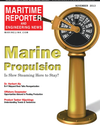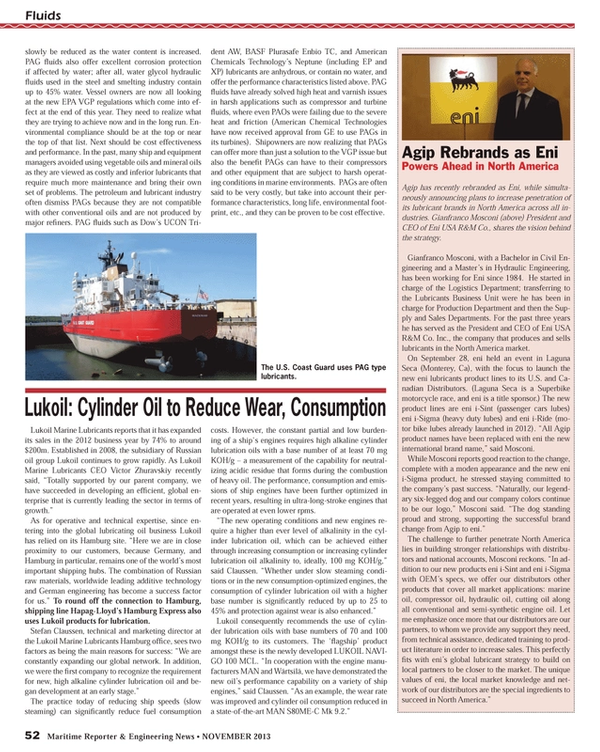
Lukoil: Cylinder Oil to Reduce Wear, Consumption
Lukoil Marine Lubricants reports that it has expanded its sales in the 2012 business year by 74% to around $200m. Established in 2008, the subsidiary of Russian oil group Lukoil continues to grow rapidly. As Lukoil Marine Lubricants CEO Victor Zhuravskiy recently said, “Totally supported by our parent company, we have succeeded in developing an efficient, global enterprise that is currently leading the sector in terms of growth.”
As for operative and technical expertise, since entering into the global lubricating oil business Lukoil has relied on its Hamburg site. “Here we are in close proximity to our customers, because Germany, and Hamburg in particular, remains one of the world’s most important shipping hubs. The combination of Russian raw materials, worldwide leading additive technology and German engineering has become a success factor for us.” To round off the connection to Hamburg, shipping line Hapag-Lloyd’s Hamburg Express also uses Lukoil products for lubrication.
Stefan Claussen, technical and marketing director at the Lukoil Marine Lubricants Hamburg office, sees two factors as being the main reasons for success: “We are constantly expanding our global network. In addition, we were the first company to recognize the requirement for new, high alkaline cylinder lubrication oil and began development at an early stage.”
The practice today of reducing ship speeds (slow steaming) can significantly reduce fuel consumption costs. However, the constant partial and low burdening of a ship‘s engines requires high alkaline cylinder lubrication oils with a base number of at least 70 mg KOH/g – a measurement of the capability for neutralizing acidic residue that forms during the combustion of heavy oil. The performance, consumption and emissions of ship engines have been further optimized in recent years, resulting in ultra-long-stroke engines that are operated at even lower rpms.
“The new operating conditions and new engines require a higher than ever level of alkalinity in the cylinder lubrication oil, which can be achieved either through increasing consumption or increasing cylinder lubrication oil alkalinity to, ideally, 100 mg KOH/g,” said Claussen. “Whether under slow steaming conditions or in the new consumption-optimized engines, the consumption of cylinder lubrication oil with a higher base number is significantly reduced by up to 25 to 45% and protection against wear is also enhanced.”
Lukoil consequently recommends the use of cylinder lubrication oils with base numbers of 70 and 100 mg KOH/g to its customers. The ‘flagship’ product amongst these is the newly developed LUKOIL NAVIGO 100 MCL. “In cooperation with the engine manufacturers MAN and Wärtsilä, we have demonstrated the new oil’s performance capability on a variety of ship engines,” said Claussen. “As an example, the wear rate was improved and cylinder oil consumption reduced in a state-of-the-art MAN S80ME-C Mk 9.2.”
(As published in the November 2013 edition of Maritime Reporter & Engineering News - www.marinelink.com)
Read Lukoil: Cylinder Oil to Reduce Wear, Consumption in Pdf, Flash or Html5 edition of November 2013 Maritime Reporter
Other stories from November 2013 issue
Content
- Interview: Dr. Herbert Aly page: 12
- Knowledge is Power page: 16
- ReFRESCO: Understanding & Designing Energy Saving Devices page: 18
- Nontank VRP Regs page: 20
- The Magic Ingredients of a Healthy Safety Culture page: 24
- e-Compliance: Revolutionizing the Efficiency of Compliance for Maritime Regs page: 28
- Pull the Handle Down... page: 30
- Return of the Electric Boat page: 38
- Fast Ferry Gets a New Power Package page: 42
- Cat tackles Tier 3 and Tier 4; Completes Berg Deal page: 44
- Konrad, Cummins Propulsion Package Partnership page: 46
- Scania 13L Inline; 16L V8 for EPA Tier 3 page: 48
- The Switch: New Drive Train Tech page: 48
- John Deere Tier 3 Engine Line Up page: 49
- GE Power Conversion page: 49
- EPA’s Vessel General Permit (VGP) & You page: 50
- Are PAGS the Answer? page: 51
- Don’t Forget: Seawater is a Free EAL page: 51
- Lukoil: Cylinder Oil to Reduce Wear, Consumption page: 52
- Agip Rebrands as Eni Powers Ahead in North America page: 52
- Floating Production Systems: Market Update page: 54
- Offshore Brazil: The Libra Field & Brazil’s Pre-Salt Policy page: 56
- On Ballast Water, Time is Running Out page: 60
- Standardization for Safer Shipping of e-Navigation & Training page: 62
- Apprenticeship Training & Academic Degree: The Pathway to Success page: 64
- The Drawing Board: Innovative OSV Design from the Ground up page: 68
- Product Tanker Hijackings page: 72
- The Trinidad & Tobago Maritime Sector page: 74
- Seatorque Boost for Brazil’s Biggest Superyacht page: 76
- Raytheon Anschütz Launches New Gyro Compass page: 85
- Emsys Upgraded to Measure Mass Emissions Rates page: 85
- Thuraya SatSleeve Transforms iPhone into Satellite Phone page: 85
- Kongsberg Debuts New Drilling Rig and Ship Simulator page: 85
- Martek: “BNWAS Password Protection is Essential” page: 85
- Northrop Grumman Radars for USN page: 85
- Imtech Debuts SeaPilot 76 page: 85
- FORAN in Indonesia page: 85
- Raymarine Autopilot page: 86
- Computer Gaming & Maritime Training page: 86
- Jeppesen Updates VVOS Software page: 86
- Harris CapRock & Carnival Sign Contract page: 86
- Carlisle & Finch SmartVIEW Technology page: 86
- Thomas Gunn Unveils New Digital Chart Management System page: 86
- CM-1000 Series: Smart Fluid Handling Tech page: 87
- Paperless Navigation page: 87
- TNKC Fleet & BASS Software page: 87
- Cobham Touchscreen Navtex page: 87
- GE Dynamic Positioning System page: 87
- Ecospeed Fuel Savings Calculator page: 87
- Boatracs’ BTConnect AIS page: 87
- New Brakes from Wichita Clutch page: 88
- Home Study Programs page: 88
- New PowerShark Tool Eats through Biofouling page: 88
- VIKING Expands Training page: 88
- SUPREME Athmos Zero-Pollution Seal page: 88
- New Inertia-Engaged Turbine Air Starter page: 88


